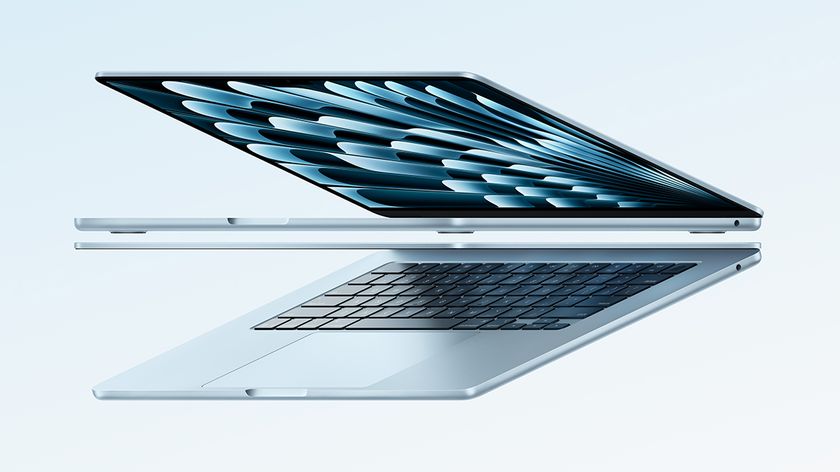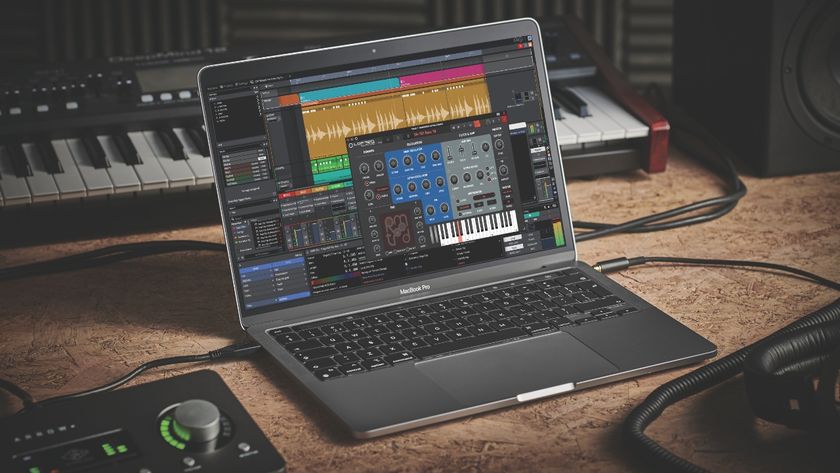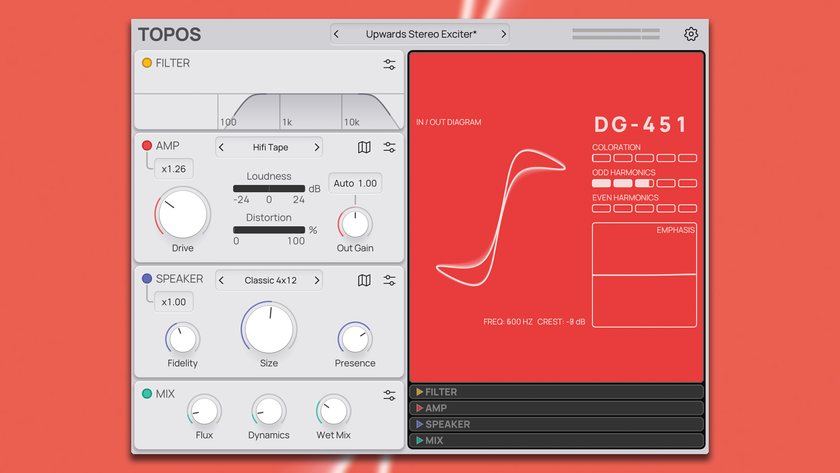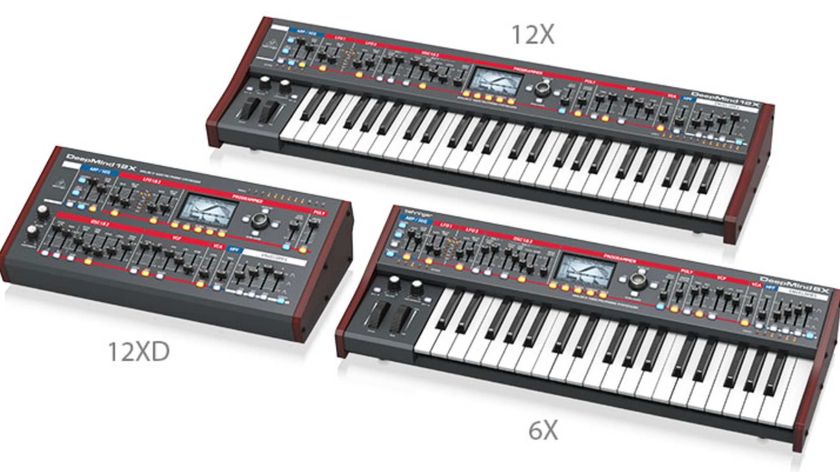Sleaford Mods: "All them A-list DJs who play their sets from the laptop? What a load of bollocks! It’s all fake… smoke ‘n’ mirrors"
Nottingham duo Jason Williamson and Andrew Fearn share the tech secrets that have given them three Top 20 albums
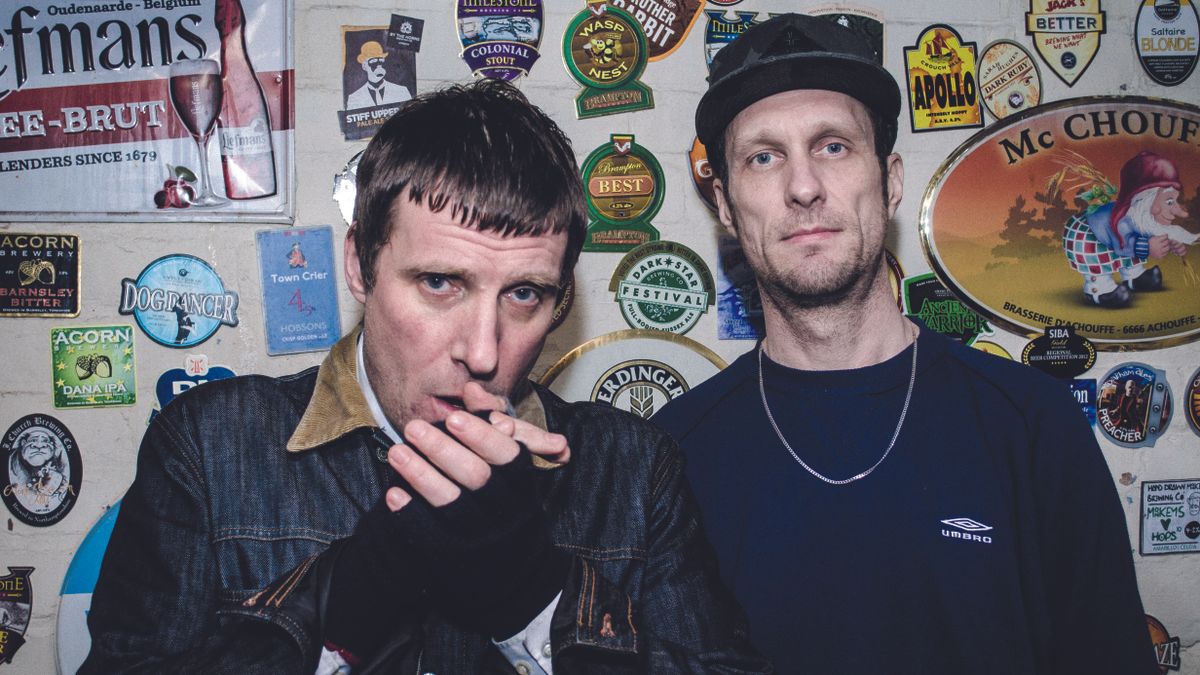
The East Midlands has a very specific accent. To anyone south of Watford Junction, it probably sounds stereotypically ‘Northern’, but to the trained ear there’s a big difference.
It’s sharper… clipped and rhythmic. And it’s great for swearing. There’s a certain poetic beauty to someone from Nottingham effin’ ‘n’ jeffin’. If you don’t believe us, listen to Urine Mate (Welcome To The Club), the opening track to Sleaford Mods’ 2013 album, Austerity Dogs. “Do you think riding around on a BMX is going to make me feel intimidated? Smash yer face, c***, back into next week.”
Frontman Jason Williamson’s urgent ranting/rapping takes on even more furious poignancy when you see him live. His arms and legs jerking his body into odd, angular shapes. Feet engaged in some sort of silent tap dance as he headbutts the air in time with the lyrics of another song about life down at the arse-end of society’s guest list.
“There’s nothing worse than someone from England trying to rap with an American accent,” says Williamson. “It can work - think about Rob from the Stereo MCs - but, most of the time, it makes you sound like a f***in’ t**t. East Midlands speech might not be glamorous, but it definitely has a groove. It can deliver passion. And, more to the point, it feels genuine. It’s my accent. It’s how I sound.
“There’s nothing worse than someone from England trying to rap with an American accent."
“If you listen to any album by, say, the Wu-Tang Clan, the lyrics often have that shouted, unattractive quality. What I do is my version of that. And if people don’t like the idea of a sexed-up East Midlands accent? F*** ’em!”
It’s a surprise to hear Williamson’s speaking voice on the phone from his home near Nottingham. Even though the conversation is peppered with expletives, the delivery is calm and measured. Joyful, even. Especially when he’s talking about the music that shaped the Sleafords’ sound. Punk rock, the aforementioned Wu-Tang Clan, Andrew Weatherall’s Two Lone Swordsmen, the first wave of UK grime.It’s an odd mix, but it’s given them three Top 20 albums and led on to collaborations with the Prodigy and Gorillaz.
Originally, the Sleaford Mods was Williamson’s solo project, but, in 2012, he was joined by another struggling Nottingham musician, Andrew Fearn. Under various guises - Infant, Marks Brother - Fearn had been banging out a wildly eclectic collection of albums for several years. Everything from crooner pop to Autechre-like experimental IDM, all of it put together in his tiny flat on an old laptop and a couple of synthesizers.
Get the MusicRadar Newsletter
Want all the hottest music and gear news, reviews, deals, features and more, direct to your inbox? Sign up here.
Fearn is the bloke you see standing opposite Williamson on stage. Dancing awkwardly behind the laptop, while swigging a can of beer. Again, and for obvious reasons, this interview is conducted by phone. Fearn is in lockdown at his dad’s house in rural Lincolnshire.
“It’s nice to have a chat with a magazine like Computer Music because some people think that I don’t actually do anything in the band,” laughs Fearn. “They assume I’m just Jason’s mate and I’ve jumped on stage for a laugh. I do have a job in the Sleaford Mods. I’m the composer… honest!”
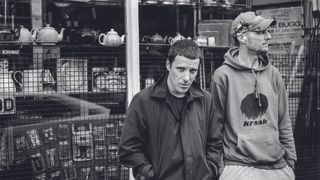
Does it bother you that some people aren’t aware of your contribution to the Sleaford Mods’ sound?
Andrew Fearn: “Not really. I’m just pretending that I’m annoyed.”
You don’t do yourself any favours, shuffling about, swigging beer. You could at least stand near the laptop and pretend to press a few keys.
AF: “You mean like all them A-list DJs who play their sets from the laptop? What a load of bollocks! It’s all fake… smoke ‘n’ mirrors. I suppose I’m trying to expose that. I’m admitting that the music is coming off the laptop. We’ve made some music, here it is. I hope people appreciate that I’m not trying to fake it. I’m just up on stage enjoying myself. It’s me that starts and stops the music. I use an open-source audio player called Foobar. Technically, I suppose I am doing some work.
“There is one thing that f***s me off, though. It’s when people call the music ‘Casio beats’, as if we don’t put any thought into the music. OK, our productions don’t have 200 different elements and 50 different remixes, but we’re still writing songs. And those songs have to be good or people aren’t going to buy ’em.
"Does it matter if we don’t have really complex drum patterns? Does it matter if we record the songs on a 10-year-old XP laptop that isn’t even connected to the internet? Of course it doesn’t!
"Does it matter if we don’t have really complex drum patterns? Does it matter if we record the songs on a 10-year-old XP laptop that isn’t even connected to the internet? Of course it doesn’t!"
"I’m sure everyone who reads Computer Music has got a mate who’s a brilliant musician and producer. He can play every instrument and he knows everything about EQ and compression and all that stuff. But he never does anything with his music because he’s too focussed on a weird frequency he can hear on the snare drum.
“Personally, I think that’s why people like us. The sound is underproduced… it’s raw and basic. But it’s also real. If we went for the big, shiny production like David Guetta, we’d sound just the same as everybody else.”
Is there a Sleaford Mods studio?
AF: “Not really. I’ve got a setup at home and we sometimes use a professional studio in Nottingham to record the vocals. We used to do everything at my flat. It was so small that Jason had to stand next to one of the speakers when he was doing vocals. There was all sorts of spill going on, but it seemed to add something that we liked… it made the vocal sound alive.”
You mentioned that the computers weren’t connected to the internet.
AF: “Well, I’ve just bought a Microsoft Surface Book. That’s connected. I wonder if I should have gone for something a bit more powerful… maybe a gaming computer. But you’re talking 10 grand. This one was three grand. Do we need a 10 grand computer? Probably not.
“But the live computer is an old Lenovo T61 - for ages, that was also the studio computer - and I’ve got a back-up T400. Neither of those are connected to the internet. It’s brilliant! The world doesn’t know that those two computers even exist. One of my recurring nightmares is that we’re about to do a big gig and the operating system decides that it’s time for an upgrade. We’re safe. Ha ha!
“The only thing that’s really changed is that I can now buy a legitimate copy of Windows XP for the Lenovo laptops. Making a bit of money means that I don’t have to skulk around in the shadows.
"Some producers look at our setup and think we’re mad. We do gigs with an out-of-date XP laptop running Acid. We’ve done massive gigs with that setup. We’ve done Glastonbury.”

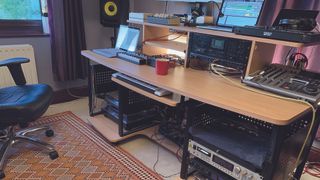
HARDWARE
Roland Boutique SH-01A
Doepfer Dark Energy
Teenage Engineering OP-1
Vermona Retroverb Lancet
Boss compressor/sustain pedal
Ampeg Scrambler pedal
Microsoft Surface Book
Arturia Audiofuse audio interface
AKG P220
Squire Jazz Bass
Cort X electric guitar
SOFTWARE
Sony Acid
Ableton Live
Various Waves plugins – including Scheps
Omni Channel
Roger Nichols Digital Detailer
iPad apps – Korg Gadget 1 and 2, AUM, DM1, DM2, SeekBeats, djay Pro and Animoog
Acid is the main platform?
AF: “I’ve got an old Mac with an old copy of Ableton on there, but most of the work gets done on Acid. It’s literally used as multitrack recording device. When I was a kid, I started out with a four-track cassette, so it makes complete sense to me. Yeah, the sound can be a bit dry, but it gets the job done.
“I’ve got mates who keep telling me to get Logic. Why? For a start, there’s a lot of arse-ing about with Logic when you’re first setting things up. Jason likes to work fast, and I think Logic would hold us up. For me, Logic is so comprehensive that it’s overwhelming. You’re bombarded with information and different shortcuts for this, that and the other, when all you want to do is bang down a bassline and some vocals.
“But I also think that I’ve avoided Logic as an anti-corporate stand. Everything’s done on iCloud now, so it’s almost like you don’t even own it. They own it. You always need their permission. With Acid, I don’t get any of that. It’s on my computer and it’s mine. I don’t need a DAW that’s going to do loads of fancy tricks… it just needs to record our music and let me mess about with it a bit.”
Any third-party plugins?
AF: “There are a few Waves plugins, including the Scheps Omni Channel. I’ve used the Roger Nichols Digital Detailer for a few years - treat it gently and it works as a nice volume booster/limiter.
"I’ve got Korg Gadget for the iPad. Can you remember that early Moog app for the iPad? I have used that for basslines. I also play some of them live with a Squire Jazz Bass. The drums come from stuff I’ve got sitting on my hard drive… recordings that I made when I was in an experimental noise band some years ago. I’ve got stacks of samples and loops. Cassettes, CDs, Minidiscs…”
Apart from the Roger Nichols Detailer, do you do much tweaking with the music once it’s in the computer?
AF: “I have a quick look at the EQs, just to make sure there’s nothing silly going on. Bit of reverb if it’s needed. You have to be careful about over-thinking a song, though. You can end up squeezing all the energy and life out of it.
"When we first took an album to be mastered, the engineer was really happy with us because we hadn’t over-engineered everything. This was during the age when everybody was pushing everything to the max and it didn’t leave mastering engineers with much to do at all.
"The way that I look at it, a mastering studio has got top-of-the range compressors that cost five or 10 grand. Whereas I’ve got a plugin that cost 50 quid. If I let them do the work, it’s going to sound better.”

How does your songwriting work? Do you give Jason more or less finished versions of songs?
AF: “Sometimes. And sometimes a song will just come together in 10 minutes while we’re working on something else. Like I said, Jason prefers to work quickly, so, if I get an idea, I like to bang it down there and then. Not too much fuss there.
“In the early days, Jason would come over to the flat and just sing the melodies at me. I’d start playing a few basslines or synth parts and Jason would say, ‘That’s the one’. Once I started to understand what he was after, it was like a green light. I was making tune after tune after tune. I love the immediacy of it.”
What’s on Jason’s vocal chain? Is it difficult trying to keep a lid on the energy he throws into a vocal?
AF: “Mainly Nectar. There’s a setting on it called Motown. I tend to start with that and tweak things till it sounds OK. It seems to keep it all in check without ruining the feel of the vocal. Again, people have had a go at me for using presets. What’s the problem? If a preset gets you in the ballpark, start there and adjust it until it’s your preset.
“I hope that I’m not giving you the impression that we’re anti-technology ’cos we’re not. I’ve recently invested in a Roland Boutique SH-01A and a load of Modular gear – mainly second-hand Mutable Instruments stuff. And I’m really digging into the theory of synth programming. If I need to get techy, I can. But what’s the point of adding stuff to a song when it doesn’t need it. Or getting too deep into the production side of things when a simple approach sounds better.
“There’s a lot written about the art of production. True sound and all that kind of rubbish. What is true sound? Take a song like Cuddly or BHS. Both of them were made on the iPad using Korg Gadget. What am I supposed to do? Put the songs on the computer and try to make the synths sound like real analogue synths? Who would you be trying to fool if you do that?
“There’s a track on the English Tapas album, Just Like We Do. After we recorded the bassline, we realised it was a bit… hummy. But it really didn’t seem worth worrying about. Who cares if it’s not perfect? Life isn’t perfect. Life is hummy. And, sometimes, your imperfections can become perfections. They can make the difference between somebody listening to your music and somebody ignoring it.”
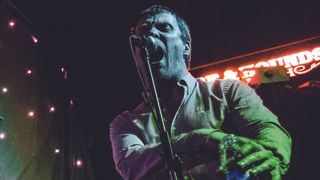
Jason Williamson on the Sleaford Mods’ musical influences
“Even at five or six, I started taking music seriously. That could have been the theme tune to my favourite cartoon or the music that was in the charts… Abba, Dr Hook or the Osmonds. My stepbrother had a few punk albums and, when I got a bit older, I became obsessed with the Sex Pistols and the Jam. I loved the anger and the energy. When I joined my first band at 11, I tried to recreate that same emotion. Unfortunately, the drummer thought I was being too aggressive, so he left. I just wanted the music to mean something. I wasn’t prepared to put up with the light-hearted nonsense like the ones you saw on Top of the Pops.
“Growing up on a working class estate in the 70s and 80s gave music added importance. So many of life’s references came from music. I didn’t know about stuff like pasta and courgettes. We had no access to these things. I learned about the world through music. That meant music needed to say something. It had to be relevant.
“Would I call the Sleaford Mods an electronic band? Yeah, because we make our music on a computer. There are some real instruments on certain tracks, but Andrew does most of the work inside the computer. Even after all these years, people still say that music made with software isn’t real music. Where’s the craft? How come you didn’t spend years learning the guitar? That’s bollocks. The first time I started making music with a computer, I felt liberated.
“I made four albums before I met Andrew, but I was still trying to work out what kind of sound I wanted. Once we started working together, it began to gel. I liked hip-hop… the simple Wu-Tang beats. But I wanted the punk influence, too. John Lydon, Mark E. Smith. The heavy bass came from the Two Lone Swordsmen album, From The Double Gone Chapel. A huge, dubby bottom end. And then there was grime. I’m talking about the first wave. I was digging out YouTube videos of tracks being made by local gangs in Nottingham. They sounded so rough and tinny, but there was so much character. Put that lot in a melting pot and you’ll end up with Sleaford Mods.
“Before things started happening for us, I’d been making music and trying to get somewhere for a long time. That makes you quite jaded and cynical. You get to a point where the music is very rough and ready, and you don’t really care about the consequences. By that, I mean you don’t worry about pissing people off. That all fed into the music, too.
“We’ve never been precious about what we do, which came in very useful when we started getting a bit more successful. Yeah, it was fantastic to be on telly and know that people were buying your records, but we were always careful to check our egos. It was like we were constantly auditing ourselves and the music. Are we still pushing forward? Is the music still valid? Have we turned into music business wankers? As long as we can stay on the right side of honesty, we should be alright.”
The Sleaford Mods’ career-spanning compilation album, All That Glue, is out now on Rough Trade.


Computer Music magazine is the world’s best selling publication dedicated solely to making great music with your Mac or PC computer. Each issue it brings its lucky readers the best in cutting-edge tutorials, need-to-know, expert software reviews and even all the tools you actually need to make great music today, courtesy of our legendary CM Plugin Suite.

